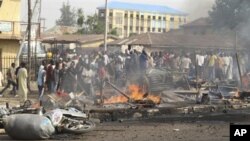Residents in the northern Nigerian city of Kaduna are trying to resume their lives after the Easter Sunday car bombing that killed at least 36 people. Scores of wounded and witnesses are attempting to come to grips with the attack.
At St. Gerald's Catholic Hospital in Kaduna, Umar Garuba lays bandaged and in pain. He is one of dozens of wounded who survived a massive explosion in the regional capital Sunday.
Garuba says that at the time of the explosion, he was pushing his wheelbarrow full of local food. He says the force of the explosion threw him and his wheelbarrow in different directions. His right hand was torn off by the blast.
Doctors say he had to have multiple blood transfusions to prepare him for surgery because he lost so much blood while waiting for delayed emergency services to arrive.
Police say the car, laden with explosives, blew up on a main city street near a Christian church. Some suspect the church was the intended target, though police are still investigating.
A St. Gerard’s Catholic Hospital spokesman, Sunday John Ali, says responding to attacks remains a challenge.
"The biggest challenge is, we need some standby ambulances because this are the challenges we are facing. This is not the first time we are seeing bomb blast, this is not the first time we are seeing situation like this ….,“ he said.
He says they had to call the National Emergency Agency and the Red Cross before they could get three victims in critical condition transferred to the teaching hospital.
Political leader Hafsat Mohamed Baba described the scene after visiting The 44 Army Reference Hospital.
“There are so many casualties. When I visited the hospital, people were laying on the floor, some were in the [operating] theater, some with their bellies open, intestines out, people were bleeding and the nurses and the doctors were running helter-skelter looking for blood. It was really very chaotic but the medical staff were really up to their heels and they were doing very well,” Baba said.
Roofs were torn off nearby buildings and debris is strewn everywhere. A large clay cooking pot lay on its side. It is all that is left of a makeshift restaurant. Femi Johnson was riding his motorbike through the area when the bomb exploded.
"I give thanks to God because I'm alive," Johnson said.
But he sustained serious burn on his arms and legs - one of the many wounded who will take a long time to heal.
Northern Nigeria is plagued by almost daily shootings and bomb attacks and Kaduna has been targeted before.
Security forces had stepped up security throughout the north for Easter weekend, after saying they uncovered multiple plots to disrupt observances.
No one has claimed responsibility for the blast, though suspicion immediately fell on the militant Islamist sect, Boko Haram, which is known to attack on Christian holidays.
Boko Haram, whose name means “Western education is sacrilege" in the local Hausa language says it wants to implement Islamic law across Nigeria.
News
Residents of Nigerian City Cope with Easter Bombing Aftermath
